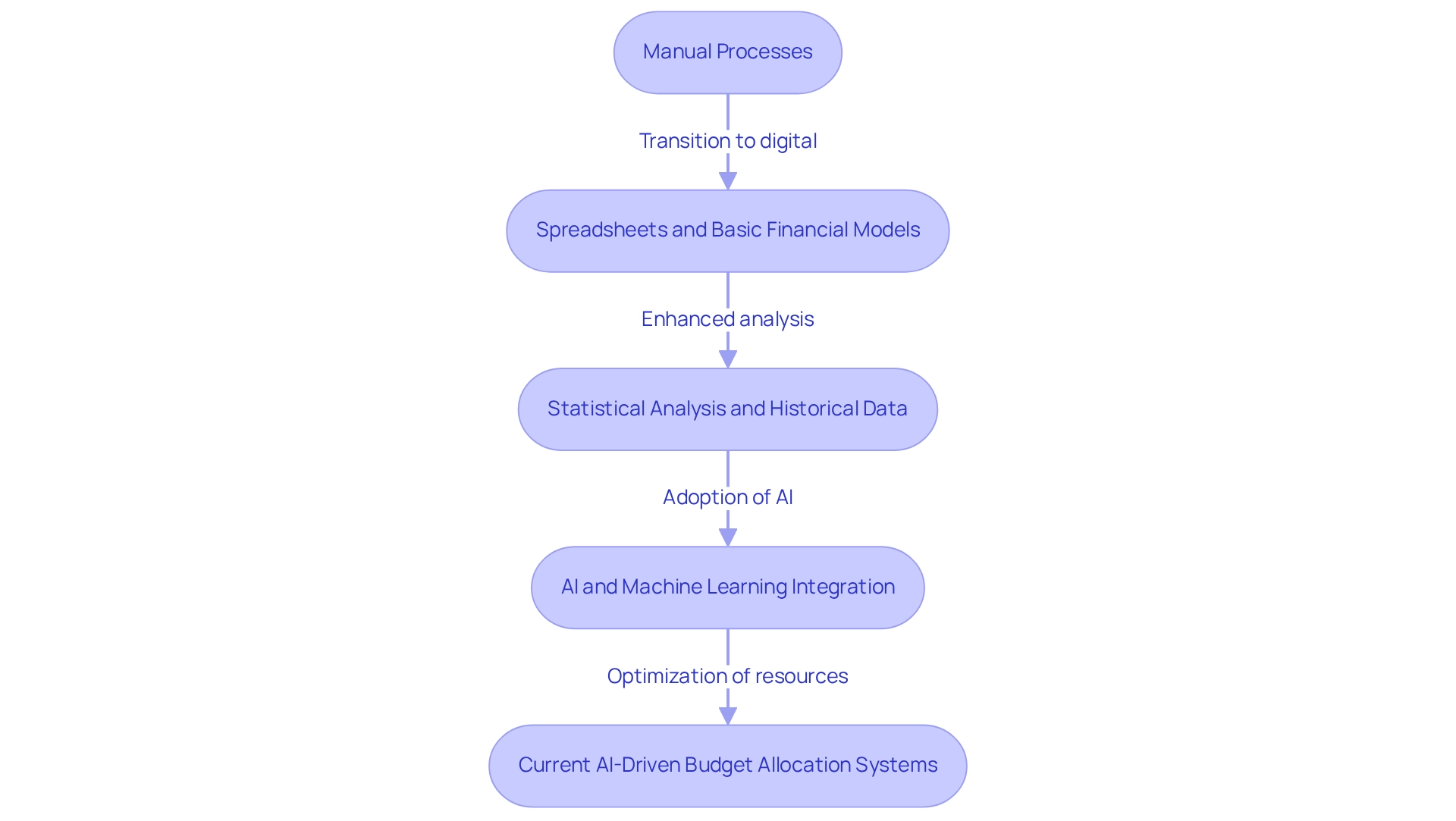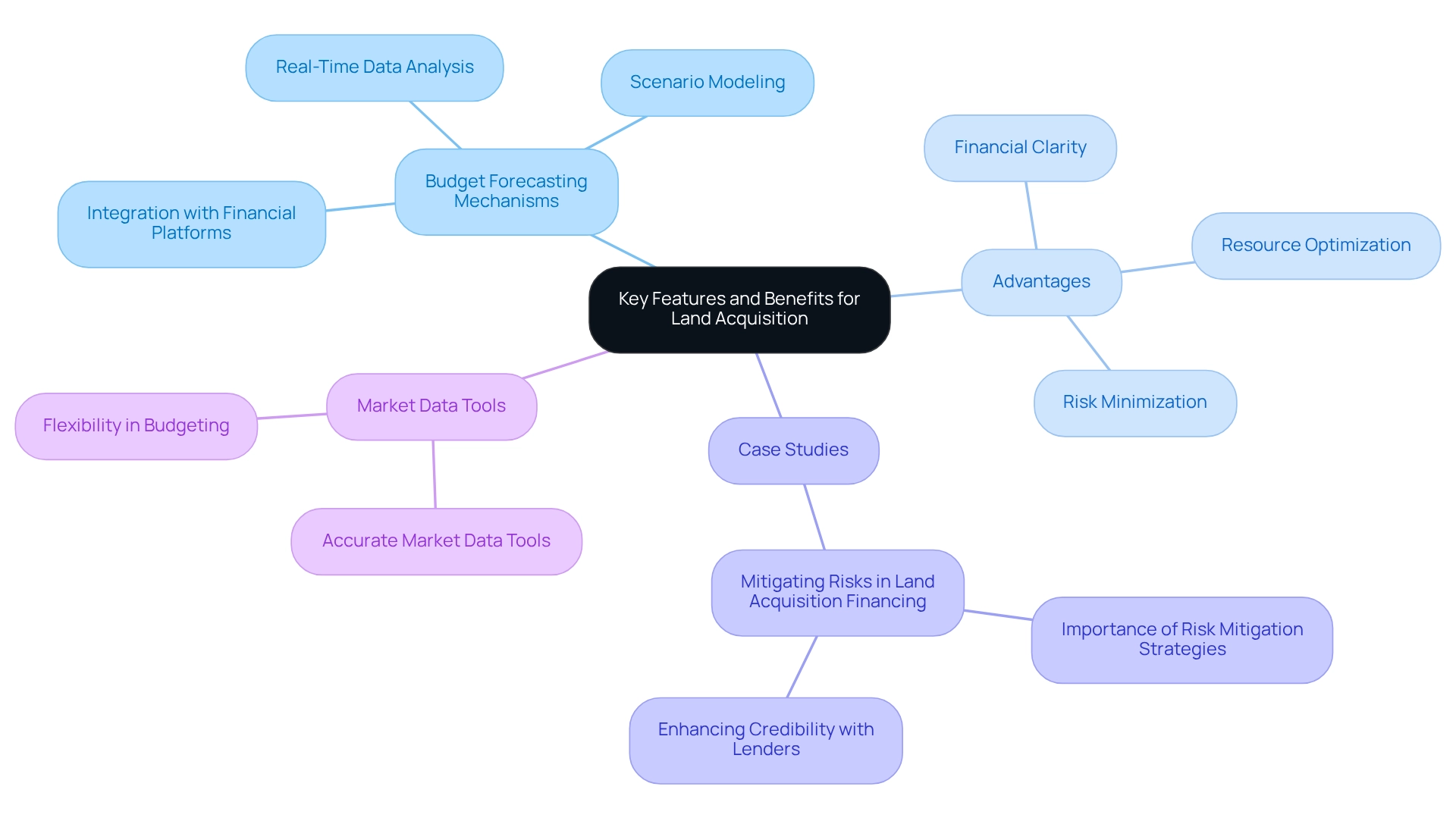Overview
Budget allocation prediction systems are essential for effective land acquisition, as they forecast financial needs and enhance resource management through advanced analytics and real-time data. These systems empower organizations to anticipate expenses, prioritize projects, and mitigate risks. Consequently, they lead to more strategic and informed decision-making in property procurement.
In the complex landscape of land acquisition, organizations face numerous challenges, including legal and regulatory hurdles. By harnessing the power of predictive analytics, these systems provide solutions that streamline the procurement process. They not only facilitate better planning but also ensure that resources are allocated efficiently.
The benefits of implementing budget allocation prediction systems are clear. They enable organizations to make proactive decisions, ultimately enhancing their operational effectiveness. As a result, organizations can navigate the intricacies of land acquisition with confidence and precision.
Consider how your organization can leverage these systems to improve its approach to land acquisition. Are you ready to transform your financial forecasting and resource management strategies? Embrace the future of property procurement with advanced analytics and real-time data.
Introduction
In the intricate world of land acquisition, the ability to predict and allocate budgets effectively is crucial for success. Budget Allocation Prediction Systems have emerged as essential analytical tools, utilizing historical data and advanced artificial intelligence to forecast financial needs with remarkable accuracy. These systems assist organizations in anticipating costs related to land purchases and legal compliance, while also playing a vital role in risk mitigation and strategic decision-making.
As the landscape of land acquisition evolves, understanding the features and benefits of these systems is essential for stakeholders navigating financial complexities and optimizing resource management. The increasing demand for infrastructure and sustainable practices underscores the necessity of integrating sophisticated predictive tools. This integration is not merely advantageous; it is imperative for achieving long-term success in this dynamic field.
Consider the challenges you face in land acquisition. Legal and regulatory hurdles can complicate the budgeting process, leading to unforeseen expenses. By leveraging predictive budget allocation systems, organizations can gain insights that lead to better financial planning and resource allocation. The benefits extend beyond mere cost prediction; these systems enhance decision-making processes, allowing stakeholders to make informed choices that align with their strategic goals.
In conclusion, as the need for effective budget management in land acquisition grows, embracing advanced predictive tools becomes a strategic imperative. Stakeholders must recognize the value these systems bring in navigating the complexities of their financial landscape, ensuring they are well-equipped to meet future challenges head-on.
Define Budget Allocation Prediction Systems
Advanced analytical tools known as Budget Allocation Prediction Systems forecast the distribution of financial resources across various projects or departments. These systems utilize historical data, statistical models, and advanced artificial intelligence to predict future budgetary needs and allocations with remarkable accuracy. In the realm of property procurement, they are essential for organizations aiming to foresee expenses related to property purchases, legal compliance, and project implementation.
Consider the economic indicators such as the GDP deflator and consumer price index; these are instrumental in assessing changes in production costs, which directly influence construction cost evaluations. By incorporating such insights, Budget Allocation Prediction Systems enhance financial planning and resource management, leading to more effective property acquisition processes.
Current statistics reveal that integrating diversification strategies within property investment budgets can significantly mitigate risks. Studies indicate that diversified portfolios can reduce volatility by up to 30%. This underscores the importance of these frameworks in achieving profitability and sustainable resource management practices. As the landscape of property procurement evolves, expert opinions emphasize the critical role of budget allocation prediction systems in navigating financial complexities and ensuring strategic resource allocation. Are you prepared to leverage these tools to optimize your financial strategies?
Contextualize Their Role in Land Acquisition
Budget allocation prediction systems are indispensable in land procurement, providing stakeholders with crucial insights into anticipated expenses and financial needs. For natural gas firms and solar developers, budget allocation prediction systems streamline resource management, ensuring adequate resources for site and right-of-way procurement, title research, and other vital services.
Organizations can make informed strategic decisions by accurately predicting financial requirements using budget allocation prediction systems, prioritizing projects based on available funding and expected returns on investment. Moreover, these frameworks are integral to risk mitigation by identifying potential budget shortfalls early, which is facilitated by budget allocation prediction systems, allowing companies to address financial challenges before they disrupt project timelines.
For example, a case study on mitigating risks in land acquisition financing underscores the significance of due diligence and insurance in securing financing, illustrating how effective risk management enhances the probability of successful land acquisition.
As the demand for robust charging infrastructure for electric vehicles escalates, the need for sophisticated budget allocation prediction systems becomes increasingly apparent. This ensures that investments are strategically aligned with market demands and financial realities. The time to invest in reliable budget forecasting solutions is now—align your financial strategies with the evolving landscape of land procurement.
Trace the Evolution of Budget Allocation Prediction Systems
The evolution of budget allocation prediction systems for budget distribution forecasting tools has been remarkable over the past several decades. Initially, organizations depended on manual processes, primarily utilizing spreadsheets and basic financial models. As the demand for accuracy in forecasting intensified, businesses transitioned to more sophisticated tools that leveraged statistical analysis and historical data. The advent of artificial intelligence and machine learning has revolutionized these frameworks, allowing for the analysis of extensive datasets and the identification of patterns that may elude human analysts. Today, budget allocation prediction systems not only forecast budget distributions but also deliver crucial insights for optimizing resource management, making them essential in the property procurement process. This transformation is highlighted by the projection that enterprises will invest over $500 billion in AI solutions by 2027, underscoring the technology's critical role in boosting efficiency and innovation across diverse sectors. Furthermore, as of the end of 2020, it was reported that 30% of web browsing and searches occurred without a screen, illustrating the increasing dependence on AI-driven technologies.
Moreover, experts from Google have indicated that the company processes 6.9 billion daily search queries through global AI technologies, showcasing the extensive application of AI in data analysis. However, this technological integration raises significant concerns, as 43% of businesses anticipate reducing their workforce due to these advancements, signaling a profound shift in employment dynamics. The historical progression of budget allocation prediction systems in property procurement reflects these trends, emphasizing the imperative for organizations to adapt to the changing landscape.

Identify Key Features and Benefits for Land Acquisition
Budget forecasting prediction mechanisms are essential tools in land acquisition, characterized by real-time data analysis, scenario modeling, and seamless integration with financial management platforms. These capabilities enable organizations to simulate diverse budgetary scenarios, assess the impacts of various funding strategies, and utilize predictive analytics for informed decision-making.
The advantages of adopting these frameworks are considerable: they foster financial clarity, optimize resource allocation, and minimize the risk of budget overruns. For example, organizations leveraging real-time data can significantly improve overall property performance; a city that incentivized developers to convert brownfield sites into affordable housing through targeted grants exemplifies how real-time data can inform effective budgeting decisions.
Additionally, case studies such as 'Mitigating Risks in Land Acquisition Financing' demonstrate that proactive risk mitigation strategies, including comprehensive due diligence and insurance, can enhance credibility with lenders and investors, thereby improving financing opportunities. These strategies are intricately linked to budget forecasting mechanisms, as they rely on accurate information to steer funding decisions.
Experts underscore that with precise market data tools, teams can navigate the budgeting process with confidence, directing property performance towards long-term financial success. Moreover, the inability to adjust assumptions in response to evolving economic conditions can lead to inappropriate budget distributions, underscoring the importance of flexibility in these frameworks.
Ultimately, the implementation of budget allocation prediction systems in energy projects not only streamlines the funding acquisition for land purchases but also enhances the success of project outcomes.

Conclusion
The significance of Budget Allocation Prediction Systems in land acquisition is paramount. These advanced tools enable organizations to forecast financial needs with exceptional accuracy, utilizing historical data and cutting-edge AI technologies. By promoting informed decision-making and strategic resource allocation, these systems effectively mitigate risks tied to budget shortfalls and unexpected costs, ensuring more seamless project execution.
As the land acquisition landscape evolves, integrating these predictive tools becomes increasingly critical. Stakeholders must navigate the growing complexities of financial management, especially amid rising demands for infrastructure and sustainable practices. By adopting these systems, organizations can significantly enhance their capacity to tackle financial challenges, streamline their budgeting processes, and ultimately secure long-term success.
In conclusion, embracing Budget Allocation Prediction Systems is a vital step for stakeholders within the land acquisition sector. By leveraging their capabilities, organizations can not only refine their financial forecasting and resource management but also position themselves to seize emerging opportunities in a constantly shifting market. Embracing these advancements is essential for those aiming to excel in the dynamic realm of land acquisition.
Frequently Asked Questions
What are Budget Allocation Prediction Systems?
Budget Allocation Prediction Systems are advanced analytical tools that forecast the distribution of financial resources across various projects or departments using historical data, statistical models, and artificial intelligence.
How do Budget Allocation Prediction Systems benefit property procurement?
These systems help organizations foresee expenses related to property purchases, legal compliance, and project implementation, enhancing financial planning and resource management.
What economic indicators are important for assessing construction costs?
Economic indicators such as the GDP deflator and consumer price index are crucial for assessing changes in production costs that directly influence construction cost evaluations.
How can diversification strategies impact property investment budgets?
Integrating diversification strategies within property investment budgets can significantly mitigate risks, with studies showing that diversified portfolios can reduce volatility by up to 30%.
Why are Budget Allocation Prediction Systems considered critical in property procurement?
They are essential for navigating financial complexities and ensuring strategic resource allocation, which is increasingly important as the landscape of property procurement evolves.
List of Sources
- Define Budget Allocation Prediction Systems
- Budgeting For Land Acquisition - FasterCapital (https://fastercapital.com/topics/budgeting-for-land-acquisition.html)
- Project Management for Construction: Cost Estimation (https://cmu.edu/cee/projects/PMbook/05_Cost_Estimation.html)
- Pre-Budget Insights: Industry Leaders Share Their Expectations (https://cxotoday.com/specials/pre-budget-insights-industry-leaders-share-their-expectations)
- Contextualize Their Role in Land Acquisition
- Voices Before the Verdict: Pre-Budget Quotes from India (https://cxotoday.com/specials/voices-before-the-verdict-pre-budget-quotes-from-india)
- Budgeting For Land Acquisition - FasterCapital (https://fastercapital.com/topics/budgeting-for-land-acquisition.html)
- Trace the Evolution of Budget Allocation Prediction Systems
- 149 AI Statistics: The Present and Future of AI [2025 Stats] (https://authorityhacker.com/ai-statistics)
- The Ultimate List of Machine Learning Statistics for 2025 (https://itransition.com/machine-learning/statistics)
- Identify Key Features and Benefits for Land Acquisition
- Budgeting For Land Acquisition And Development Costs - FasterCapital (https://fastercapital.com/topics/budgeting-for-land-acquisition-and-development-costs.html/1)
- Budget Allocation: Understanding the Role of Data in Budget Allocation - FasterCapital (https://fastercapital.com/content/Budget-Allocation--Understanding-the-Role-of-Data-in-Budget-Allocation.html)
- Maximizing Budget Accuracy: The Power of Real-Time Property Analytics (https://multifamilyinsiders.com/multifamily-blogs/maximizing-budget-accuracy-the-power-of-real-time-property-analytics)
- Budgeting For Land Acquisition - FasterCapital (https://fastercapital.com/topics/budgeting-for-land-acquisition.html)




